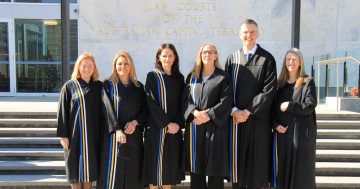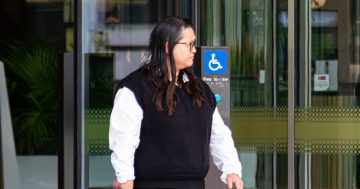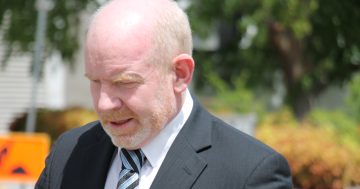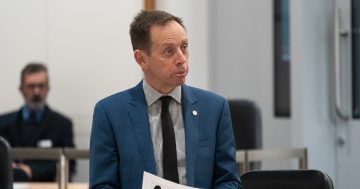
Grace Tame speaking at the National Press Club last week. Photo: NPC Twitter.
The debate over changing sexual abuse legislation, which characterises statutory rape as a “sexual relationship with a child or young person” to “the persistent sexual abuse of a child”, has been reinvigorated in the ACT.
Alex, a survivor-advocate from Canberra, criticised the current wording of the legislation, following the National Press address from Australian of the Year, and a leading voice in the #LetHerSpeak campaign, Grace Tame.
“The wording not only minimises the seriousness of the crime but it also implies that the survivor of the abuse has an understanding of the complexity of what a sexual relationship is and therefore insinuates consent,” she said.
“Grooming is not a relationship. Abuse is not a relationship. Rape is not a relationship.
“The wording also feeds into the perpetrator’s delusion that what they are doing isn’t abuse.”
The updated definition would bring the ACT in line with changes to Tasmania’s legislation resulting from Ms Tame’s campaign.
According to Alex, a change in the wording would also encourage survivors to come forward and help them find their voice by hopefully negating some of the unnecessary guilt, shame and self-blame they go through.
“The changing of the wording to ‘the persistent sexual abuse of a child’ reflects the severity not just of the crime but of the grooming process,” she said.
“Grooming is persistent. There is no reprieve. The suggested wording also doesn’t imply that the child is a willing participant as using the word ‘relationship’ does.
“The suggested wording change will hopefully help survivors that have experienced historical sexual abuse that might have previously thought about coming forward only to see the current wording of the legislation is not supportive of survivors.”
Attorney-General Shane Rattenbury said sexual assault law reform is a “high priority” for his department following the push from survivors and advocates to change the oversimplified wording in the current legislation.
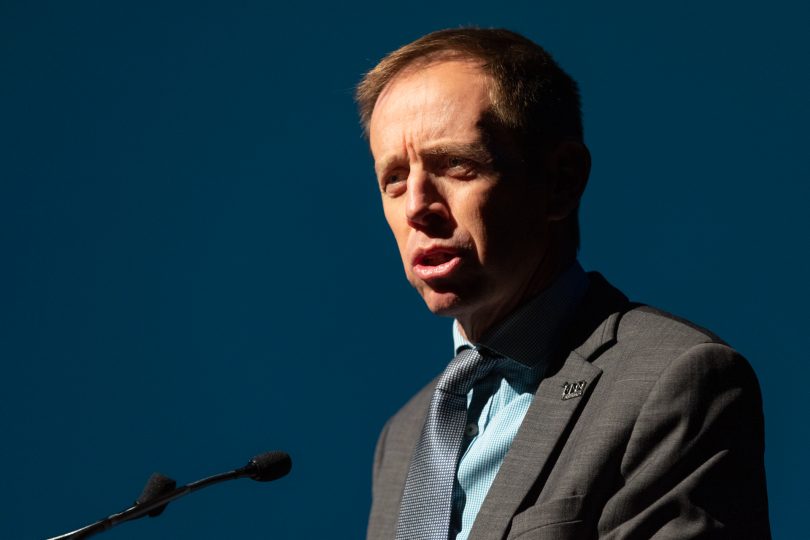
Attorney-General Shane Rattenbury says sexual assault legislation reform is a high priority for the Government. Photo: Michelle Kroll.
Mr Rattenbury acknowledged the importance of a strong criminal justice response to sexual offending. He said the government would conduct further conversations with the ACT’s Sexual Assault Reform Program to amend the legislation.
“The ACT Government is committed to protecting people from sexual abuse and ensuring that those who commit sexual offences are appropriately held to account,” he said.
“Grace Tame’s powerful speech [at the National Press Club] was a reminder that there is more work to be done to protect our community from perpetrators of sexual assault.
“[We want] to ensure we adequately capture the systematic abuse of a child while retaining the legal effectiveness of the provision.”
The ACT Government is also liaising with the Sexual Assault Reform Program to consider including a positive definition of consent.
It was an issue also raised by Ms Tame in her address.
“We have eight different state and territory jurisdictions and eight different definitions of consent,” she said.
“We need to agree on something as absolute as what consent is. We need a uniform, state and federal, national standard definition of consent.
“Only then can we effectively teach this fundamentally important principle consistently around Australia.”
The Attorney-General previously told Region Media that the Government was reviewing the work published by the NSW Law Reform Commission on the issue at the end of last year and is working to “progress reforms to modernise and improve sexual consent laws”.
If this story has brought up any issues, you can contact the Canberra Rape Crisis Centre’s support line on 6247 2525 between 7:00 am and 11:00 pm for all counselling-related inquiries, including all appointments and referrals.
1800RESPECT, the national sexual assault, domestic and family violence counselling service, can be contacted 24 hours a day, seven days a week on 1800 737 732.












